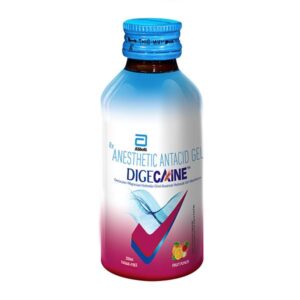ANESTHETIC ANTACID GEL
ANESTHETIC ANTACID GEL: ANESTHETIC ANTACID GEL, also known as Lidocaine Viscous, is a medication that is used to treat conditions such as heartburn, gastroesophageal reflux disease (GERD), and peptic ulcers. It is classified as a local anesthetic and antacid.
Mechanism of Action:
ANESTHETIC ANTACID GEL works by numbing the pain and discomfort caused by acid reflux and other digestive conditions. Lidocaine, the active ingredient in the gel, is a local anesthetic that blocks nerve signals and reduces pain sensation. The antacid properties help to neutralize stomach acid, providing relief from heartburn and stomach acidity.
Dose:
The recommended dose of ANESTHETIC ANTACID GEL is usually 5-10 mL (1-2 teaspoons) to be taken orally. It is typically used as needed, usually 30-60 minutes after meals and at bedtime. The dose may vary depending on the severity of symptoms and the individual’s response to the medication. It is essential to follow the instructions provided by the doctor or pharmacist.
Side Effects:
Although ANESTHETIC ANTACID GEL is generally well-tolerated, it may cause some side effects. Common side effects include temporary numbness or tingling sensation in the mouth or throat, dizziness, drowsiness, mild burning or irritation at the application site, and changes in taste sensation. These side effects are usually mild and transient.
In rare cases, severe allergic reactions to ANESTHETIC ANTACID GEL may occur. Symptoms of an allergic reaction may include rash, itching, swelling, severe dizziness, trouble breathing, or swelling of the face, tongue, or throat. If any severe side effects occur, immediate medical attention should be sought.
It is important to consult with a doctor or pharmacist before using ANESTHETIC ANTACID GEL to ensure it is safe for use and to determine the appropriate dosage for the individual’s specific condition.

